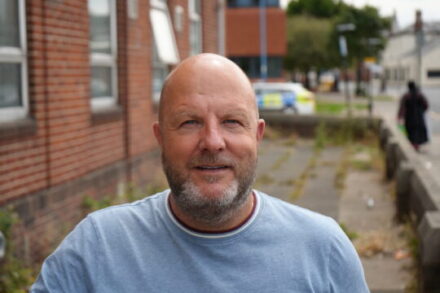Darren – Recovery Coordinator

Darren has worked in substance use services for three years and finds it a deeply rewarding role where each day brings an opportunity to support individuals through the most challenging periods of their lives.
Working in substance use has allowed Darren to bring all of his experience together. He is proud to be part of a service that provides vital, compassionate support — helping people reduce harm, regain control, and improve their quality of life.
What’s your role and what does a typical day look like for you?
As a Recovery Coordinator in substance use services, my role is to support individuals on their journey to recovery from drug and alcohol dependency. A typical day can involve carrying out assessments, developing person-centred recovery plans, coordinating with partner agencies, and providing ongoing keywork sessions.
I also help people access medical treatment, mental health support, housing, and employment services. Every day is different, and i adapt to the individual needs of the people I support.
What’s the most rewarding part of your job?
The most rewarding part is seeing positive change, whether that’s someone reducing their use, rebuilding family relationships, finding stable housing, or simply starting to believe in themselves again. Being part of someone’s journey and seeing their resilience grow is incredibly fulfilling.
What inspired you to work for a drug and alcohol service?
I’ve always been passionate about supporting vulnerable people, and I wanted to work in a role where I could help individuals facing some of the most difficult challenges. Addiction doesn’t define a person—it often stems from trauma, pain, or unmet needs. I wanted to be someone who listens without judgment and offers real support when it’s needed most.
What’s one thing people might not know about your role?
Many people assume we just tell people to stop using substances, but it’s so much more than that. We’re working with complex trauma, mental health issues, housing instability, and social exclusion.
Recovery is not linear, and relapse can be part of the process. Our role is about building trust, providing consistency, and offering a safe space to explore change.
What does ‘Breaking the stigma’ mean to you?
Breaking the stigma means challenging the harmful stereotypes and assumptions about people who use drugs or alcohol. It’s about recognising that addiction is a health issue, not a moral failing. By breaking the stigma, we open doors to compassion, support, and real recovery.
Why do you think it’s important to encourage people to seek help and support
Seeking help can be life-changing and lifesaving. Many people suffer in silence because they fear judgment or feel ashamed. Encouraging people to reach out shows them they’re not alone, and that recovery is possible. With the right support, people can heal, grow, and rebuild their lives.